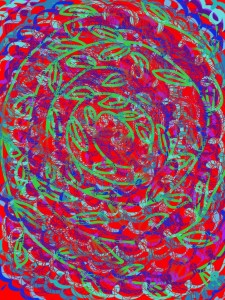
If you donate, shoot me an e-mail or drop a comment here and I will make sure you are on the mailing list for the next one.
From Pamphlet series #3 of A Visitor’s Guide to Tabat, published by Spinner Press.
While in Tabat, you’ll want to try the drink it’s famous for: chal. Salty fish and seaweed are mixed with strong black tea in what is admittedly an acquired taste for many. The drink supplies the city dwellers with energy and places to exchange thoughts and news. Many chal houses pride themselves on the antiquity of their brews, which may be years, decades, or in at least one case, centuries old.
The Dancing Cup: Located at the edge of Salt and the Serpentine, the Cup hosts students from the nearby College of Mages. Go here to catch a glimpse of them showing off new spells and minor magics, particularly in the open air of the back courtyard. Their house chal is over a hundred years old, but they offer many variants, including cider and other fruit drinks. Open all hours.
Two chal shops near Tabat’s Arena are renowned: the Blade’s Savor and Berto’s. Fierce rivalry between the two often leads to savings for customers willing to switch allegiance. Both shops frequently sponsor Gladiators, many of which will be spotted drinking and telling stories in one or the other. Bella Kanto and the majority of the Brides of Steel school can be found in Berto’s. These are the only shops you’ll find open during Tabat’s Games. Open all hours.
The Salty Purse, situated a block from the docks on Trade Way, claims a chal of over 200 years provenance, and serves only that, along with ship’s hardbread, doing a hearty business in the former, if not the latte. Open all hours.
In Tabat’s small theater district, the Fuchsia and Heron is favored by actors and wealthy theater goers. The most expensive shop in the city, it subsidizes actors’ tabs and even pays a few to patronize it, ensuring a steady flow of Tabat’s most glittering figures. Open from the last afternoon bell till the last night bell only.





2 Responses
I did a couple weeks ago, and I will see if I can’t donate a little more on payday. Whoot for you and keep up the great work!
Anne
Anne – You are definitely on the mailing list! Thank you. 🙂